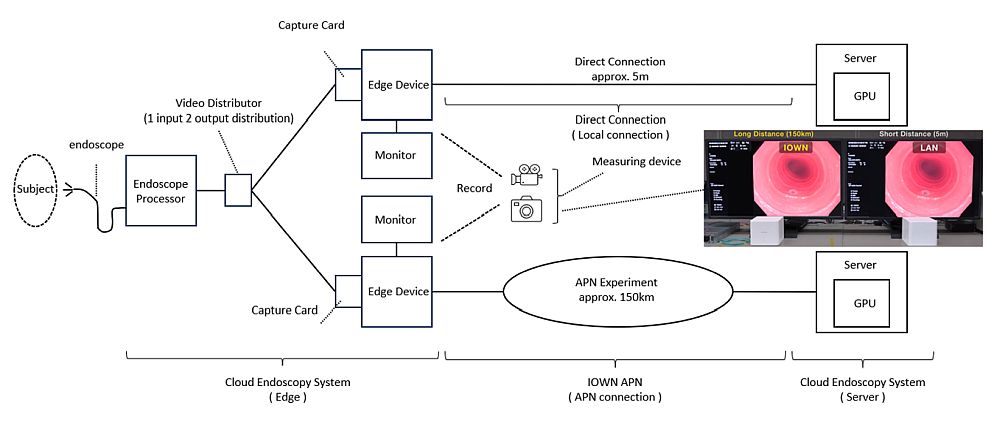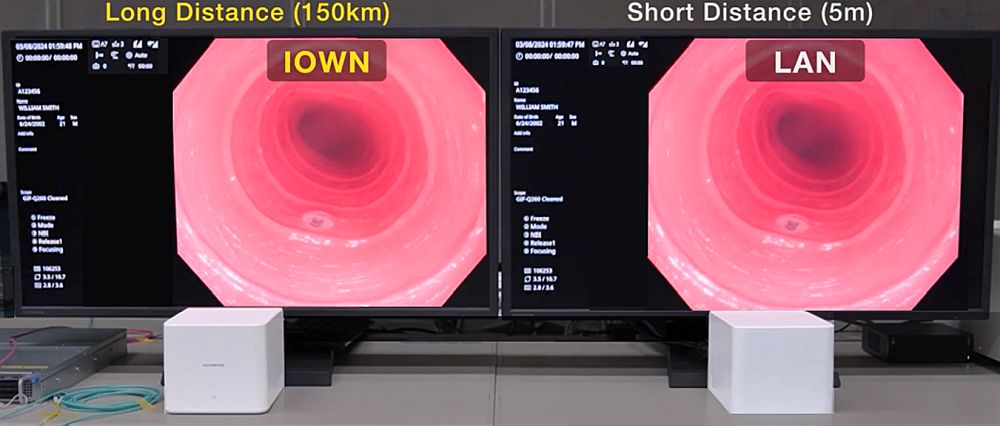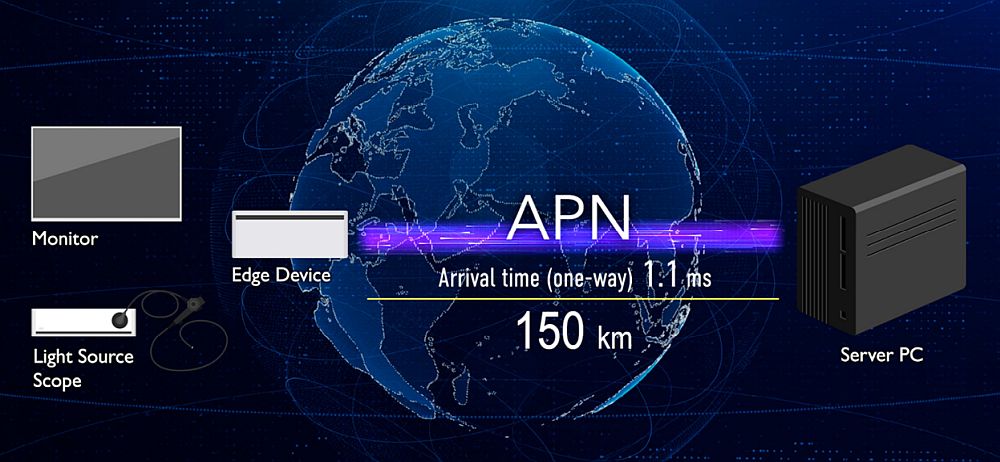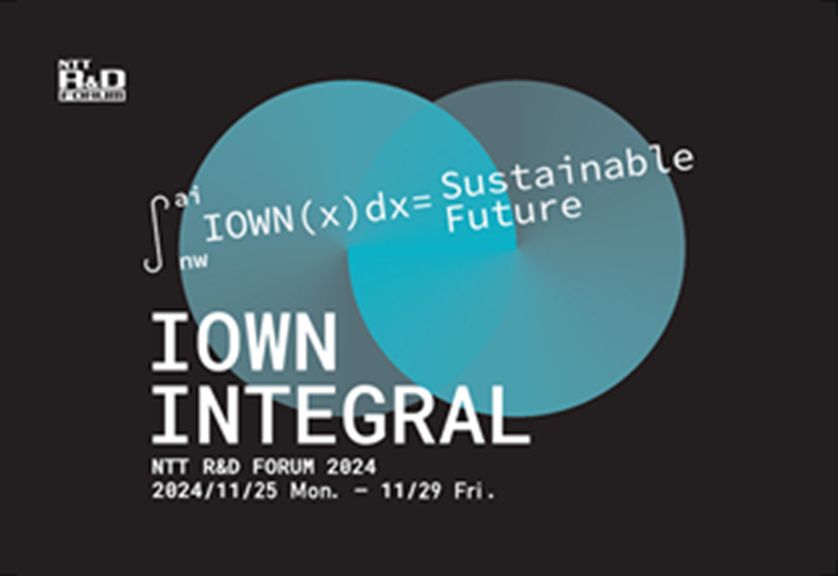NTT and Olympus Joint Demonstration Shows IOWN APN’s Low-latency Capability Can Be Used for Real-time Diagnosis and Treatment on a Remote Server to Realize World’s First Cloud Endoscopy System
News Highlights:
- By configuring the cloud endoscopy system with the latest IOWN APN1 (All Photonics Network; “APN”) technology, issues with latency were resolved, confirming that real-time diagnosis and treatment for patients through a remote server 150km away is feasible.
- Based on this result, NTT and Olympus will collaborate in studying the technical challenges towards the full-scale implementation of the cloud endoscopy system.
TOKYO, Nov 19, 2024 – (JCN Newswire) – NTT Corporation (TSE: 9432; “NTT”) and Olympus Corporation (TSE: 7733; “Olympus”) today announced that, following the start of their joint experiment in March of the world’s first cloud endoscope system which processes endoscopic videos on the cloud, they jointly established a cloud endoscopy system utilizing the IOWN APN technology, and have demonstrated that the APN technology can solve network issues in realizing the cloud endoscopy system. Moving forward, the two companies will collaborate for the full-scale implementation of the cloud endoscopy system and enable performance and functional improvements of endoscopy systems through the cloud, contributing to society through improving access to advanced medical care.
Parts of the results of this joint experiment will be exhibited at the NTT R&D FORUM 2024 – IOWN INTEGRAL2 event in Tokyo from November 25 to 29, 2024.
 Figure 1: Overview of Cloud Endoscopy System
Figure 1: Overview of Cloud Endoscopy System
Background
An endoscope is a medical device in which a flexible tube is inserted into the natural openings of the body to perform an examination and obtain tissue samples. Instances where endoscopes can be utilized are increasing year by year due to the equipment’s low level of invasiveness and high level of safety, and the technology is becoming increasingly sophisticated.
However, current endoscopes handle all its functions within the endoscope device, making performance limitations and maintainability an issue. In addition, it is expected that more cases in the future will require flexible feature improvements and updates based on new user needs, such as real-time remote diagnosis and treatment. Therefore, there is discussion on cloud computing endoscopes, in which some functions with a high processing load, such as image processing, can be done on the cloud.
To achieve image processing of endoscopes on the cloud, a network that connects the endoscope device and the cloud is vital. A lag in the network can lead to delay in the images in response to the endoscope operation, causing discomfort to the endoscopy operator. To prevent this, high-quality images captured by the endoscopy must be sent stably and with low-latency to an image processing system in the cloud, which has been a challenge.
Overview of demonstration experiment
This demonstration experiment combined the advanced technology of Olympus’ endoscopes with NTT’s high-speed, low-latency APN technology aimed at realizing real-time endoscope video processing in the cloud (Figure 1).
(1) Configuration of the cloud endoscopy system
In this joint demonstration experiment, we connected a video processing server (“server”), distanced 150km away from the device that inputs endoscopy images (“edge device”), to the APN and configured it as the cloud endoscopy system (Figure 2).
The video captured by the endoscope was sent to the edge device via an endoscope processor, and then was transferred without any compressing to the server via the APN. The server then processed the video utilizing AI and other technology, and sent the processed video back to the edge device. Finally, the monitor which is connected to the edge device displayed the processed video for the endoscope operator to view.

(2) Roles of each company
The roles of each company for the demonstration experiment were divided as following.
NTT:
Provided the APN experiment environment and evaluated the APN connectivity and network quality.
Olympus:
Provided the endoscope device and evaluated the performance of the cloud endoscopy system and the processing capability of the software.
Results of the joint demonstration experiment
The experiment used both a local configuration with a distance of 5m (assumed to be processed within the endoscope device) and an APN configuration with a distance of 150km which each processed the endoscopy video. The capture cards recorded the videos displayed on the endoscopy operator’s monitor, measured the network’s data latency, and compared the two videos (Figures 3 and 4).
Due to the nature of endoscopy procedures, where operators perform examinations and surgeries while checking the video displayed on the monitor in real-time, the video captured by the scope needs to be processed and displayed without delay. If the video data (4K/60fps) is delayed even by a few frames, it will cause discomfort to the operator.
This experiment was conducted with the goal of achieving a data transfer latency within 1 frame (under 16 milliseconds), considering the distance of approximately 150km. In result, the latency was 1.1 milliseconds, demonstrating that it was possible to transfer data at 1/10 of the target latency (Figure 5).
Furthermore, regarding the difference between the videos processed locally and via the APN, a visual review by the operator confirmed that there was little difference in latency and fluctuation, demonstrating that latency in the APN would not be an issue in video processing.
Through confirming that video processing between an edge device and a server separated by 150km is possible, this demonstrates the possibility of combining the video processing of hospitals in large areas, such as the entire metropolitan area, to a remote server, which is a valuable insight for the implementation of a cloud endoscopy system in the future.



In light of these results, we were able to demonstrate that the APN can resolve network challenges related to a high-capacity network for transmitting high-quality images, which is necessary to realize the cloud computing of endoscopes, and a low-latency network for displaying inspection images without delay.
Outlook
Moving forward, the two companies will continue to study technical issues for social implementation of cloud endoscopy, such as advanced security measures for medical data in network transmission and real-time remote diagnosis and treatment by sharing image information among multiple hospitals.
Through this initiative, NTT will establish a reference model for medical device networks that solves the various technical issues involved in the cloud computing of medical devices, and Olympus will contribute to the establishment of optimal networks and reference models for cloud endoscopy systems and other such systems.
Terminology
1. IOWN APN (All Photonics Network)
The IOWN is comprised of three components: the “All Photonics Network (APN),” which makes it possible not only for networks but also for device processing; the “Digital Twin Computing,” which enables advanced and real-time interaction between objects and humans in cyberspace; and the “Cognitive Foundation,” which efficiently deploys various ICT resources.
By introducing new optical technologies from the network to devices and chips, APN achieves ultra-low power consumption and ultra-high-speed processing, which has been difficult to achieve. By assigning wavelengths to each function on a single optical fiber, we can provide multiple functions that support our social infrastructure, including information and communication functions such as the Internet and sensing functions, without interfering with each other.
2. NTT R&D FORUM 2024 – IOWN INTEGRAL official website: https://www.rd.ntt/e/forum/2024/
About NTT
NTT contributes to a sustainable society through the power of innovation. We are a leading global technology company providing services to consumers and business as a mobile operator, infrastructure, networks, applications, and consulting provider. Our offerings include digital business consulting, managed application services, workplace and cloud solutions, data center and edge computing, all supported by our deep global industry expertise. We are over $97B in revenue and 330,000 employees, with $3.6B in annual R&D investments. Our operations span across 80+ countries and regions, allowing us to serve clients in over 190 of them. We serve over 75% of Fortune Global 100 companies, thousands of other enterprise and government clients and millions of consumers.
About Olympus
At Olympus, we are committed to Our Purpose of making people’s lives healthier, safer and more fulfilling. As a global medical technology company, we partner with healthcare professionals to provide best-in-class solutions and services for early detection, diagnosis and minimally invasive treatment, aiming to improve patient outcomes by elevating the standard of care in targeted disease states. For more than 100 years, Olympus has pursued a goal of contributing to society by producing products designed with the purpose of delivering optimal outcomes for its customers around the world. For more information, visit https://www.olympus-global.com/ and follow our global X account: @Olympus_Corp.
Media contacts
NTT IOWN Integrated Innovation Center
Public Relations
https://tools.group.ntt/en/rd/contact/index.php?param01=R¶m02=101
Olympus Corporation
Public Relations
Global-Public_Relations@olympus.com
Olympus Corp [TYO: 7733][ADR: OLYMY][FRA: OLYS] https://www.olympus-global.com
Source: Olympus
Sectors: Telecoms, 5G, Environment, ESG, BioTech, Healthcare & Pharm, Funds & Equities, MedTech
Copyright ©2024 JCN Newswire. All rights reserved. A division of Japan Corporate News Network.






